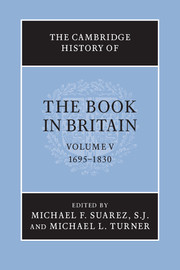Book contents
- Frontmatter
- Introduction
- PART I THE QUANTITY AND NATURE OF PRINTED MATTER
- PART II ECONOMIC, LEGAL AND CULTURAL CONTEXTS
- PART III THE TECHNOLOGIES AND AESTHETICS OF BOOK PRODUCTION
- PART IV THE BOOK TRADE AND ITS MARKETS
- I LONDON AND THE ‘COUNTRY’
- 13 London and the central sites of the English book trade
- 14 Personnel within the London book trades: evidence from the Stationers’ Company
- 15 The English provincial book trade: evidence from the British book trade index
- 16 The Scottish book trade
- 17 The Irish trade
- II TWO CASE STUDIES
- III SERIAL PUBLICATION AND THE TRADE
- IV THE INTERNATIONAL MARKET
- V BOOKS AND THEIR READERS
- Abbreviations used in bibliography
- Bibliography
- Index
- Frontispiece
- Plate section
- References
14 - Personnel within the London book trades: evidence from the Stationers’ Company
from I - LONDON AND THE ‘COUNTRY’
Published online by Cambridge University Press: 28 September 2010
- Frontmatter
- Introduction
- PART I THE QUANTITY AND NATURE OF PRINTED MATTER
- PART II ECONOMIC, LEGAL AND CULTURAL CONTEXTS
- PART III THE TECHNOLOGIES AND AESTHETICS OF BOOK PRODUCTION
- PART IV THE BOOK TRADE AND ITS MARKETS
- I LONDON AND THE ‘COUNTRY’
- 13 London and the central sites of the English book trade
- 14 Personnel within the London book trades: evidence from the Stationers’ Company
- 15 The English provincial book trade: evidence from the British book trade index
- 16 The Scottish book trade
- 17 The Irish trade
- II TWO CASE STUDIES
- III SERIAL PUBLICATION AND THE TRADE
- IV THE INTERNATIONAL MARKET
- V BOOKS AND THEIR READERS
- Abbreviations used in bibliography
- Bibliography
- Index
- Frontispiece
- Plate section
- References
Summary
Introduction
Many years ago I suggested that Fernand Braudel’s view of society as l’ensemble des ensembles, or a set of sets, was a particularly helpful way of approaching the book trade, of describing it and mapping it. In choosing this expression Braudel wished to remind us ‘that any given social reality we may observe in isolation is itself contained in some greater set; that as a collection of variables, it requires and implies the existence of other collections of variables outside itself’. He recommended the idea of sets ‘to provide an approach to a problem, to lay down some guidelines for preliminary observation. If it makes that observation easier, both at the beginning and in later stages, if it helps to produce an acceptable classification of the material and to develop the logic of the argument, then the definition is useful and has justified itself.’
Book-trade historians have long been involved in defining such sets of one sort or another. Biographical listings by trade and/or locality have been an important element in the way the subject has been approached and have played a major part in the publishing activities of the Bibliographical Societies. In the period covered by this volume there are many relevant works including Plomer’s two ‘Dictionaries’ Maxted on the ‘London Trade’ Pollard on the ‘Dublin Trade’ McKenzie’s ‘Apprentices’ Humphries and Smith’s ‘Music Publishers’ both Ramsden’s and Howe’s ‘Bookbinders’ Todd’s ‘London Printers’ Twyman’s ‘Lithographic Printers’ Tyacke’s ‘London map-sellers’ Hodgson and Blagden’s identification of the membership of the various congers; Belanger’s tracing of publishing partnerships through the trade-sale catalogues; and Treadwell’s listing of the London trade publishers in the early eighteenth century. Though many of these are predominantly concerned with the London trade, there is also a great deal available relating to the provinces. In particular, the work of the late Peter Isaac’s team is now manifest in the British book trade index and the contributions listed by John Feather. All may be said to be defining subsets within the principal set that is our concern – the book trade.
- Type
- Chapter
- Information
- The Cambridge History of the Book in Britain , pp. 309 - 334Publisher: Cambridge University PressPrint publication year: 2009

